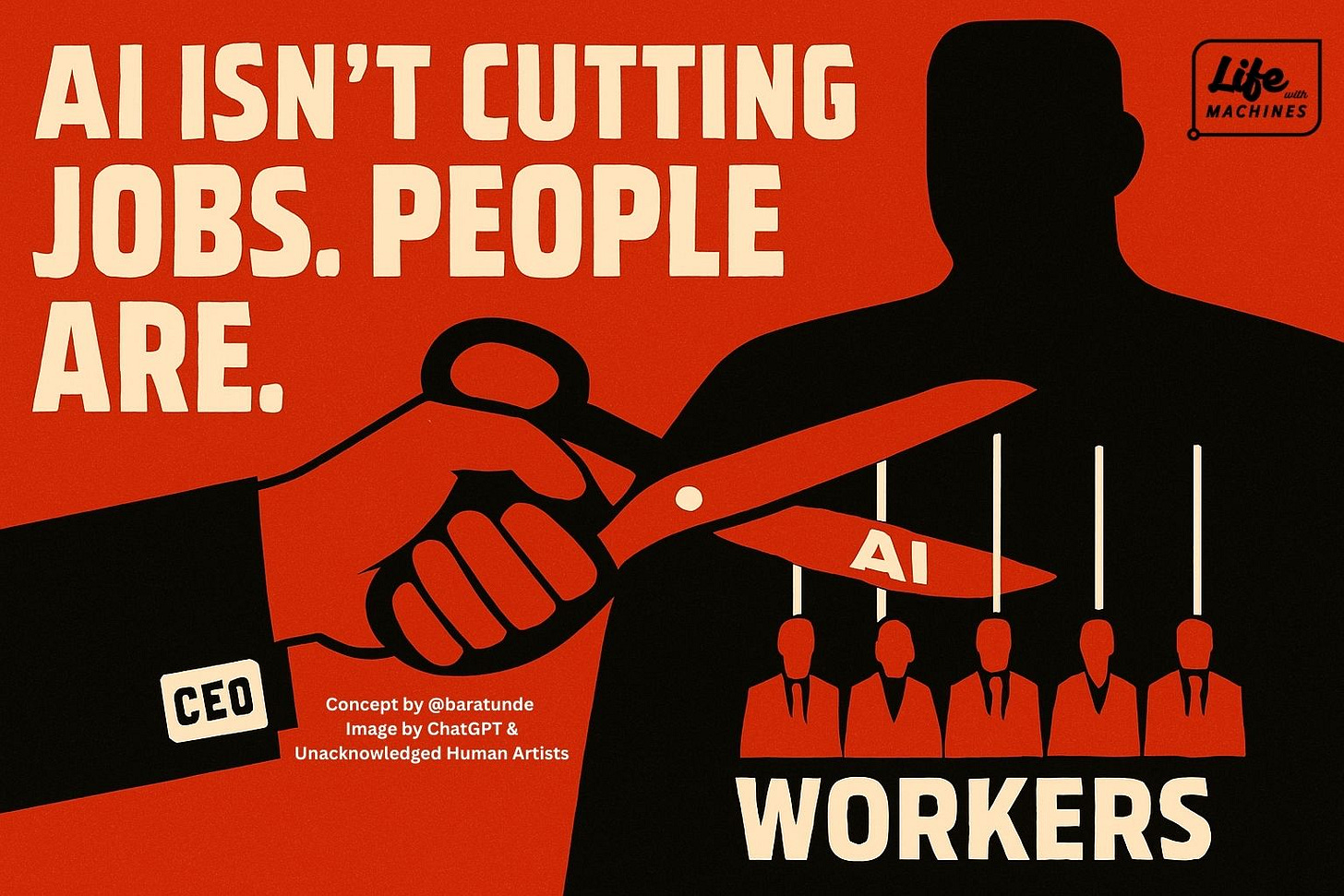Why AI is NOT Taking Your Job or Doing Anything Itself
How we talk about the future shapes it + my old semi-secret TV pilot
First, some news from the Life With Machines Cinematic Universe. We submitted a panel to SXSW 2026 to build off last year’s success. We propose to lean into the absurdity, comedy, and satire of this AI moment. Check it out and vote for Stand Up to the Singularity: Comedy Takes On AI.
Hi you,
If you’re coming here off of LinkedIn, welcome. Do yourself a favor and take one step away from the algorithm and toward a direct relationship with us. Subscribe directly to our newsletter!
There’s something big missing from the conversation around AI. I’ve been feeling this for years and am finally ready to name it plainly. We’ve been making AI the protagonist in our story and that linguistic choice, not the capabilities of leaning machines themselves, is the bigger threat to our future.
What if AI isn’t doing anything—including taking your job?
That’s the prompt I want you to sit with. Because how we talk about this moment will help shape this moment.
You’ve seen the headlines:
The framing makes it sound like there’s a force of nature (or literally, not nature) barreling down on us, inevitable and unstoppable. The machines are against us, and we’re powerless.
But as Dr. Rumman Chowdhury reminded me in our conversation on Life with Machines, AI isn’t doing anything. People are using AI. And those people have names, jobs, shareholders, incentives. When we erase them, we erase our own agency.
This idea clicked for me because I had felt it before—in a very different context.
In the summer of 2020, amid the pandemic and the protests after George Floyd’s murder, I joined an online seminar with poets Mahogany Browne and Yahdon Israel. Yahdon is a writer, founder of LiterarySwag Book Club, and now a senior editor at Simon & Schuster. What floored me was his dissection of grammar in the headlines like “George Floyd was killed.”
At first glance, it sounds right—solemn, respectful even. This was the season of “say their names” as we wanted to honor the lives police had taken through excessive use of force. But as Yahdon explained, it subtly puts the weight of action on Floyd, not on the officer who killed him. Contrast that with: “Derek Chauvin killed George Floyd.” Suddenly the actor, the system, the accountability are right there in the sentence.
Yahdon taught me that language is never neutral, and there is a grammar to systems of oppression. When we put victims in the passive role, we unintentionally obscure power and responsibility. And once he showed it to me, I saw it everywhere: “Black people earn less than…” instead of “Industries pay Black people less than white people,” or “Women are more likely to be killed by men” instead of “Men kill women…” etc. etc. Same data, wildly different accountability.
Here’s an entire podcast episode I did during that wild summer to highlight Yahdon’s lesson:
Fast forward to today’s AI coverage. “AI is taking jobs.” Same trick. Same disempowerment. Suddenly AI itself becomes the protagonist, when in fact it’s CEOs choosing to cut 80% of their workforce, investors demanding higher margins, or politicians failing to enact guardrails. Saying “AI took the jobs” is a great way to let people off the hook.
It matters because when we make humans invisible in the story, we convince ourselves there’s nothing we can do. If AI is just “coming for us,” then why resist? Why organize? Why demand different choices?
But if we name the humans, we remind ourselves we have power. AI didn’t take the job—your company did. A board of directors did. A handful of decision-makers did. And if they made those decisions, then we can contest them, appeal to them, or build alternative systems with different incentives to encourage different choices.
This shift isn’t just academic for me—it’s shaping how we do Life with Machines. We’re being more intentional about language because it shapes the future we create. The words we use can either obscure power or illuminate it.
So here’s my request: the next time you hear someone say “AI is taking jobs” or see a headline that removes agency from people and the companies they run, take a pause. Be super mindful as you take in messaging and notice where this lack of agency tries to creep into your own thinking.
Do this exercise next time you’re scrolling: re-write the first three headlines you see about AI to put the accountability back where it belongs (on the people!). Ask yourself: how does this change my perspective, my feelings on what I’m seeing?
— Baratunde
Thanks to Associate Producer Layne Deyling Cherland for editorial and production support and to my executive assistant Mae Abellanosa.
And now for a special treat for paid subscribers
In August 2017, I taped a pilot late night show called CITIZEN. It was my version of a John Oliver-type series, and I made it with some alumni friends from The Onion. For our single-topic focus, we chose the theme of automation, and my opening monologue was about the threat to jobs. There’s a bunch of foresight in the analysis and some still-relevant jokes that the team and I came up with.
Keep reading with a 7-day free trial
Subscribe to Life With Machines to keep reading this post and get 7 days of free access to the full post archives.

